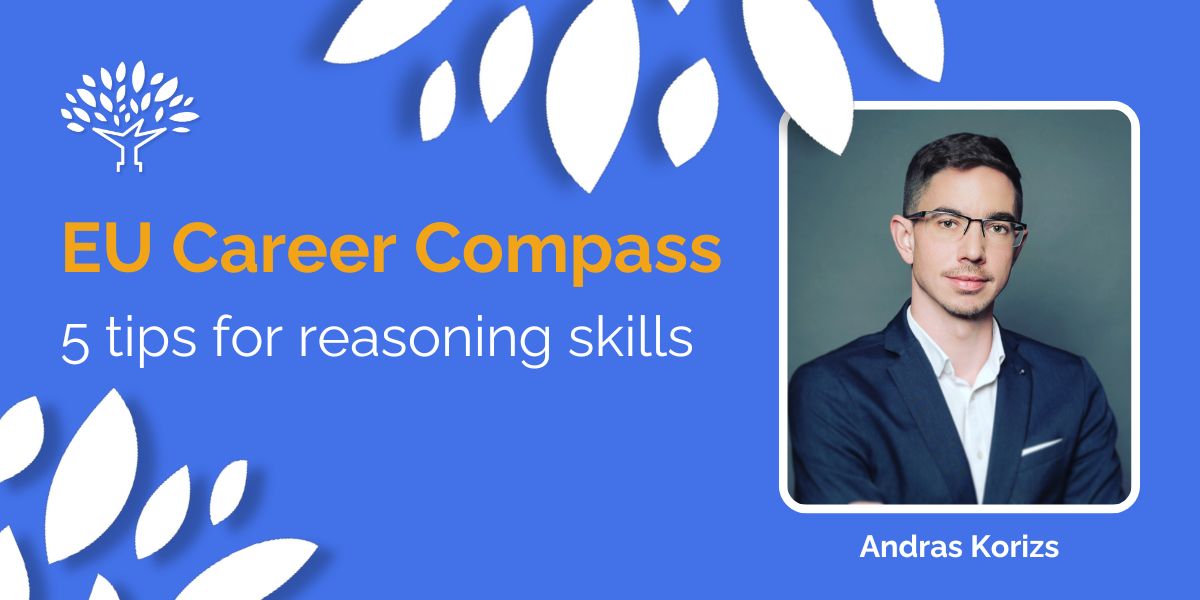
My firsthand experience of preparing for and trying several times before passing the EPSO computer-based tests many (many, many) years ago, inspired me to help other candidates and led me to become a trainer and personal coach.
Now, with over 10 years of reasoning skills coaching under my belt, I see the most difficult issues that EU exam candidates face when they start preparing for the EPSO or CAST CBT.
The Computer-based tests (CBTs) form THE major building block of the EPSO and CAST selection process. Therefore, it’s important to be aware of how to approach this test.
- Familiarise yourself with the exam and prepare accordingly.
One major key to success on these tests is to familiarise yourself with the composition of the test elements, which may vary from competition to competition. EPSO publishes a Notice of Competition when applications open – consult the exam description carefully.
- Look at the pass mark for each type of reasoning test,
- Are there any combined pass marks?
- Is it pass/fail?
- Or must you be among the highest-scoring candidates?
These elements will strongly influence your preparation strategy. Based on this information, you might give more attention to elements with more weight, for example. Then you can start reviewing the methodology for three types of reasoning skills tests.
- Manage your time well and don’t get stuck on hard questions.
The most common situation test-takers face is getting stuck on a difficult question. By spending too much time on more difficult questions, they don’t have enough time for the rest of the questions. This leads to increased stress that gets worse as they go through the questions and time starts running out. The result is a poor performance overall. Two things are very important to understand related to this:
- The questions are never ordered according to difficulty level.
- The test rewards candidates with the most questions answered correctly, not the ones who solve the hardest problems.
This is why it is critical to include the ‘skip or solve’ concept in your time management. If you don’t know where to start a question, move to the next one. There will be easier ones that you can tackle quickly and then you’ll have time to attempt the harder ones at the end.
When looking into the individual elements of the CBT, some of the most important thoughts are the following ones:
- Don’t underestimate Verbal Reasoning.
Throughout the decade of my EPSO CBT experience as a personal coach, most students only request training for numerical and abstract reasoning. However, it’s beneficial to understand the major concepts behind the verbal reasoning test. And:
- It is paramount to understand that the verbal reasoning test is a logic test, not a language or lexical knowledge test.
My students/clients complain relatively often about the quality of translations as a reason for poor performance on the Verbal Reasoning Test. However, when we reviewed the issues they had, it turned out that they just needed to become aware of certain aspects of the verbal reasoning test methodology. Once they learned that, their test scores improved immensely.
- Don’t fear Numerical Reasoning.
Numerical reasoning is no doubt the most feared reasoning test. This is usually because candidates haven’t studied numerical concepts typically since high school. However, when I start coaching them, it quickly turns out that those concepts are still stored in their heads, and we can build on their base knowledge. If you spend time and effort on building up your base knowledge your test performance can improve in a very short period. The most important messages for the numerical reasoning tests:
- Review underlying concepts first – without being aware of them, you won’t be able to translate the questions into calculations.
- The list of concepts used is minimal. The most important element is percentage calculation – if you master its elements, you will already be able to solve multiple questions.
- Most exams no longer allow a physical calculator and paper – learn the concepts that require the least calculator use.
- Make educated guesses on the Abstract Reasoning test.
Last, but not least, a few words about abstract reasoning. This type of test question is an unusual one for most people, and first impressions are generally negative, at least from what I’ve witnessed with my clients. However, within a short period, as my students start to understand the concepts, it can quickly turn into a more positive and exciting test-taking experience.
The test methodology for abstract reasoning can be grasped fairly quickly, for example how to follow the movements, colors, shapes, and interactions between the pictures. The most important takeaways are:
- Review the rule-making concepts.
- Be extremely careful with your time: there is only one minute per question!
- If you are running out of time, make an educated guess based on the patterns you can identify among the answer options.
The reasoning skills test can be a breeze if you practise enough, learn the methodology and know how to manage your time.
You can contact András directly if you would like expert coaching for the EPSO reasoning skills tests. Or check out the ‘Master the EPSO CBT’ training sessions schedule here, and book a slot for the next online or in-person classroom.
